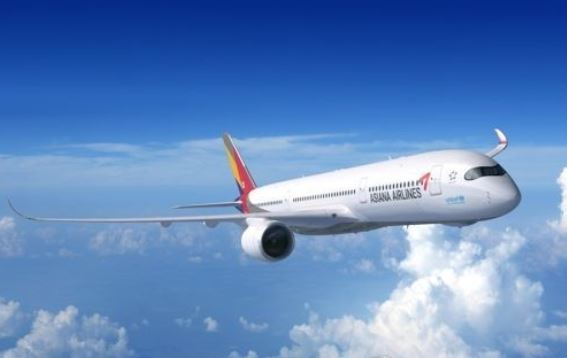Asiana Airlines Inc., South Korea's second-biggest passenger carrier, is struggling to improve its business amid an ongoing diplomatic row over the deployment of a missile defense system here and increased competition with budget carriers, industry sources said Monday.
Under its three-year restructuring plan that ends in December 2018, Asiana Airlines has cut costs, incorporated redundant business departments, and reorganized its fleet and routes.
The airline announced the plan in December 2015 after it had performed poorly in the previous three years due to challenges from low-cost carriers.

As part of the three-year self-help programs, Asiana has reduced the number of offline branches to 14 from 23 at home and to 92 from 128 abroad. Instead, it has increased investments to make customers book tickets more convenient on the Internet and mobile phones, a company official said.
To provide more seats on its major routes, Asiana has renovated 15 passenger jets in the first half and plans to do the same thing for another 15 planes in the second half. It will also transform two passenger jets into cargo planes by December to meet growing freight demand.
On top of the renovation plans, Asiana will add two A350 jets to its fleet in the second half to strengthen services on profitable long-haul routes. It has already introduced two A350s on routes to San Francisco in the first half, it said.
"In recent years, low-cost carriers have emerged as a threat to full-service carriers in short-haul routes," a company official said. "Moreover, we expect a prolonged impact from diplomatic rows with China over the deployment of the Terminal High Altitude Area Defense system and North Korea's nuclear and missile threats on our businesses. The second-half earnings results are expected to remain weak."
In March, China banned the sale of group travel packages to South Korea in an apparent retaliation against the THAAD deployment here. Beijing has explicitly opposed the US anti-missile system, arguing it could be used against it though Seoul has said it is purely aimed at defending against missile threats from Pyongyang.
Affected by China's travel ban and tougher competition with budget carriers in Asian routes, Asiana Airlines' net losses widened to 74.8 billion won ($66 million) in the January-June period, from 26.7 billion won a year earlier.
In 2016, the country's six budget carriers -- Jeju Air Co., Jin Air Co., Air Busan Co., Air Seoul Inc., Eastar Jet Co. and T'way Air Co. -- transported nearly 60 percent of passengers on domestic routes and 20 percent of passengers traveling abroad, according to the transport ministry. (Yonhap)

















![[KH Explains] Hyundai's full hybrid edge to pay off amid slow transition to pure EVs](http://res.heraldm.com/phpwas/restmb_idxmake.php?idx=652&simg=/content/image/2024/04/18/20240418050645_0.jpg&u=20240418181020)

![[Today’s K-pop] Zico drops snippet of collaboration with Jennie](http://res.heraldm.com/phpwas/restmb_idxmake.php?idx=642&simg=/content/image/2024/04/18/20240418050702_0.jpg&u=)